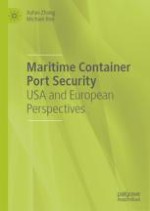
2019 | OriginalPaper | Buchkapitel
4. Models of Container Port Security
verfasst von : Xufan Zhang, Michael Roe
Erschienen in: Maritime Container Port Security
Aktivieren Sie unsere intelligente Suche, um passende Fachinhalte oder Patente zu finden.
Wählen Sie Textabschnitte aus um mit Künstlicher Intelligenz passenden Patente zu finden. powered by
Markieren Sie Textabschnitte, um KI-gestützt weitere passende Inhalte zu finden. powered by